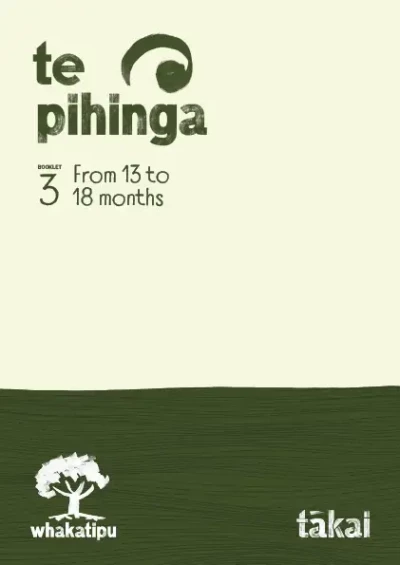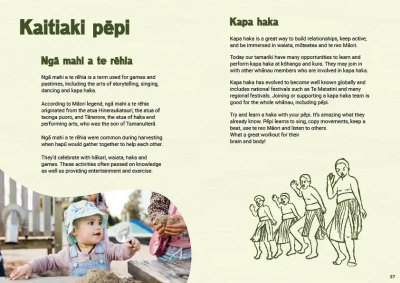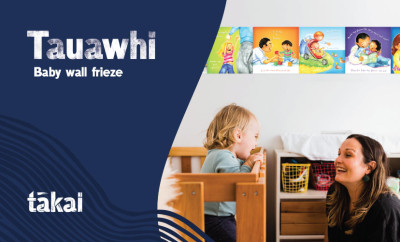
Ngā mahi a rēhia
Learning traditional Māori games and cultural activities is important for passing on knowledge and skills to tamariki and helps contribute to their physical and mental development.
‘Ngā mahi a te rēhia’ refers to games and pastimes. With whānau, read Whakatipu booklet Te Pihinga 3, ‘Kaitiaki pēpi’ (page 26). It explains the legends and games in traditional Māori culture.
Ngā mahi a te rēhia included the art of pūrākau , playing taonga puoro , waiata, haka, poi, kōrero and tākaro . It also included aquatic games, activities requiring manual dexterity, agility, calculation, mental alertness and memorising.
Some pastimes were specifically for children, and some were elementary training exercises for boys.
Benefits of playing games
Pūrākau and waiata are rich in traditional knowledge, history and tribal wisdom. Haka, poi and musical instruments enhance physical and mental development. Hākinakina were sports and games enjoyed by both children and adults. Children gained physical skills and knowledge of tribal traditions through them.
Ask whānau:
- How does ngā mahi a te rēhia feature in your whānau?
- What sorts of games or activities have you enjoyed or been involved in?
- What traditional games do you know of or have taken part in?
- Do you have hopes that pēpi will enjoy certain games?
- Which ones?
Tūpuna Parenting: Pūrākau
Tūpuna Parenting: Pūrākau (transcript)
Hana Tuwhare:
He koha nei from Tāne Mahuta.
Liz Harte:
Pūrākau, or myths and legends as they’re commonly called, are really a history from our past. We are descended from the atua and from our tūpuna, and so pūrākau are really an actual history woven into stories, that are easy to remember and passed down from generation to generation.
Hana Tuwhare:
We can bring our pūrākau and whakapapa into our everyday lives with pēpi. When we’re out walking in the environment, in the park, in the ngahere, we can be talking about Tāne Mahuta.
Liz Harte:
Absolutely! Or if you go to the beach you can talk about Tangaroa and waves and the sea and the creatures in the sea.
Hana Tuwhare:
Āe. Or if we’re seeing the moon we can talk about Rona.
Liz Harte:
And when the wind is blowing, we could say ‘oh that’s Tāwhirimātea’.
Hana Tuwhare:
Āe. E kaha ana a Tāwhirimātea i tēnei rā.
Liz Harte:
Exactly. Talking about the pūrākau and the atua with our pēpi really normalises that tūpuna knowledge, the mātauranga with them in their everyday life.
Hana Tuwhare:
So we can talk about what pēpi is interested in. This just might be some leaves to us, but for pēpi a leaf is new and exciting. So we can kōrero about the leaf and its relationship to Tāne Mahuta, about how it gives us shade.
Liz Harte:
Āe, you can start with the pūrākau and the atua that perhaps you already know, or you can ask your parents or grandparents if they know some pūrākau that you can share with your pēpi.
Hana Tuwhare:
And I learned a lot of pūrākau from pukapuka when I was young, which were all free from the library.
Liz Harte:
Exactly. And once you’re familiar with some of these stories, be it Rangi and Papa or talking about Māui. So then you can share them with your pēpi, with your tamariki, normalising that knowledge for everyday life.
Past and present toys and games
Traditional toys were made from natural resources. For example, harakeke and raupō were used to make gliders and small waka. Whai (string games), karetao (puppets) and tī ringaringa (hand games) all helped tamariki develop hand-eye coordination and skills with their hands.
A few of the pastimes common in pre-European times that have survived into the present day include tree climbing, water games and exercises, swimming races (kau whakataetae), canoe races (waka hoehoe), diving, hand games (tī ringaringa and matimati ) and cat’s cradle (whai).
 pdf 11 MB
pdf 11 MB













